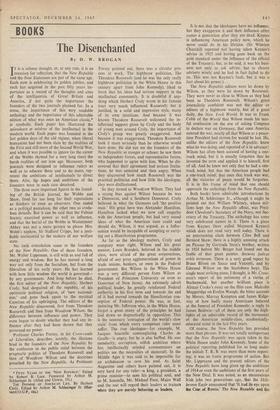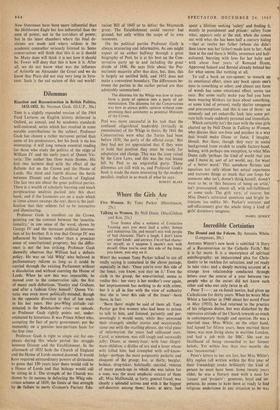BOOKS The Disenchanted
By D. W.
BROGAN
IT is a solemn thought, or, at any rate, it is an occasion for reflection, that the New Republic and the New Statesman are just of the same age. Each now is celebrating its golden jubilee, and each has acquired in the past fifty years im- portance as a record of the thoughts and aims of the intelligentsia of Great" Britain and America, if not quite the importance the founders of the two journals planned for. In a sense, the importance of this very readable anthology and the importance of this admirable edition of what was once an American classic,* is symbolic. Each paper has illustrated the splendeurs et miseres of the intellectual in the modern world. Each paper was founded in the last golden days of the old regime, when liberal humanism had not been slain by the realities of the First and still more of the Second World War, and when it was possible to ignore (as the career of the Webbs showed for a very long time) the harsh realities of our iron age. Moreover, both journals were designed to influence rulers as well as to educate them and to do more, rep- resent the ambitions of intellectuals to direct them. Alas, the hopes and ambitions of the founders were in each case deceived.
The three most important figures in the found- ing of the British journal, the Webbs and Shaw, lived far too long for their reputations as thinkers or even as observers. One ended as a political pantaloon, the other two as credu- lous dotards. But it can be said that the'Fabian Society exercised power as well as influence, and that the burial of the Webbs in Westminster Abbey was not a mere gesture to please Mrs. Webb's nephew, Sir Stafford Cripps, but a justi- fiable testimonial to the makers of our welfare state.
No such consolation came to the founders of the New Republic. One of those founders, Mr. Walter Lippmann, is still with us and full of energy and wisdom. But he has moved a long way not only from the Socialism, but from the liberalism of his early years. He has learned with how little wisdom the world is governed— by any government. And long before he died, the first 'editor of the New Republic, Herbert Croly, had despaired of the republic, of his optimistic political religion, of 'new national- ism,' and gone back again to the mystical Comtism of his upbringing. The editors of the New Republic discovered, first from Theodore Roosevelt and then from Woodrow Wilson, the difference between influence and power. They even began to doubt whether they had any in- fluence after they had been shown that they possessed no power. Professor Charles Forsey, in his Cross-roads of Liberalism, describes, acutely, the illusions bred in the founders of the New Republic by the confusion in the public mind between the pragmatic politics of Theodore Roosevelt and then of Woodrow Wilson and the doctrines preached by the New Republic. As Professor
* FIFTY YEARS OF THE 'NEW REPUBLIC.' Edited by Robert B. Luce. Foreword by Arthur M. Schlesinger Jr. (Allen and Unwin, 35s.) THE PROMISE OF AMERICAN LIFE. By Herbert Croly. Edited by Arthur M. Schlesinger Jr. (Has- vard/O.U.P., 48s.)
Forsey pointed out, there was a circular pro- cess at work. The highbrow politician, like Theodore Roosevelt (and he was the only really highbrow politician in the White House in this century apart from John Kennedy), liked to learn that his ideas had serious support in the intellectual community. It is doubtful if any- thing which Herbert Croly wrote in his famous tract very much influenced Roosevelt; but it justified, in a solid and impressive style, many of its own intuitions. And because it was known Theodore Roosevelt welcomed the in- tellectual support given by Croly and the body of young men around Croly, the importance of Croly's group was greatly exaggerated. And because it was exaggerated, Theodore Roosevelt took it more seriously than he otherwise would have done. He did not see the founders of the New Republic as stooges or echoes; he saw them as independent forces, and representative forces, who happened to agree with him. When he dis- covered that their agreement had serious limita- tions, he was annoyed and then angry. When they discovered how much Roosevelt was the practical politician and how little the ideologue, they were disillusioned.
So they turned to Woodrow Wilson. They had a strong bias against Wilson because he was a Democrat, and a Southern Democrat. Croly believed in what the Germans call 'the positive state.' His great hero was Alexander Hamilton. Hamilton lacked what we now call empathy with the American people, but had very sound ideas of what the American state could and should do. Wilson, it was argued, as a Jeffer- sonian would be incapable of accepting or carry- ing out a Hamiltonian programme.
As far as the ideology matters, Croly and company were right. Wilson and his great mentor, Louis Brandeis, believed in the middle class, were afraid of the great corporations, afraid of any great agglomerations of power in trade unions, bankers, or even in the Federal .government. But Wilson in the White House was a very different person from Wilson as President of Princeton University or even as Governor of New Jersey. An extremely adroit political. leader, he greatly reinforced Federal authority in his first term and towards the end of it had moved towards the Hamiltonian con- ception of Federal power. He was, in fact, imitating Mr. Jefferson who, in the White House, forgot a great many of the principles he had laid down so dogmatically in opposition. This is the necessary 'contagion of the world's slow stain' from which every competent ruler must suffer. The true ideologue—for example, M. Jacques Soustelle contemplating Charles de Gaulle—is angry, but he is also baffled. He sees mendacity, corruption, selfish ambition where less intellectually minded commentators on politics see the necessities of statecraft. In the Middle Ages it was said to be impossible for an archdeacon to save his soul. As Saint Augustine and others have pointed out, it is very hard for any ruler—a king, a president, a prime minister—to save his political soul, and so M. Soustelle, Mr. Michael Foot, Major Wall and the rest will regard their leaders as traitors when they are merely behaving as leaders. It is not that the ideologues have no influence, but they exaggerate it and their influence often comes a generation after they are dead. Keynes is influencing American policy now, which he never could do in his lifetime. (Sir Winston Churchill repented not having taken Keynes's advice in 1925 and having gone back on the gold standard under the influence of the official of the Treasury; but, as he said, it was his busi-. ness not only to ask advice, but to choose advisers wisely and he had in fact failed to do so. This was not Keynes's fault, but it was a fact about his power.)
The New Republic editors were let down by Wilson, as they were let down by Roosevelt. They were never as close to Wilson as they had been to Theodore Roosevelt. Wilson's great journalistic confidant was not the editor or editors of a highbrow weekly, but of a great daily, the New York World. It was to Frank Cobb of the World that Wilson made his tear- ful confession on the eve of asking Congress to declare war on Germany, that once America entered the war, nearly all that Wilson as a peace- time President had striven for would be lost. He, unlike the editors of the New Republic, knew what he was doing, and repented of it in advance! Wilson has often been accused of having a one- track mind, but it is usually forgotten that he invented the term and applied it to himself, first of all. And he knew not only that he had a one- track mind, but that the American people had a one-track mind; that once that track was war, all the victories of peace would be forgotten. It is in this frame of mind that one should approach the anthology from the New Republic.
Both books have admirable introductions by Arthur M. Schlesinger Jr., although it might be pointed out that William Whitney, whose mil- lions kept the New Republic afloat, was Presi- dent Cleveland's Secretary of the Navy, not Sec- retary of the Treasury. The anthology has some very celebrated names in it. There is a piece from Keynes (here called Maynard. Keynes) which does not read very well today. There is an entertaining clash between Clive Bell and Bernard Shaw; there is a highly amusing attack on Picasso by Gertrude Stein's brother, written in 1924 before Mr. Berger had found out the faults of that great painter. Securus judicat orbis terrarum. There is a very good report by Bruce Bliven on Sacco and Vanzetti, and by Edmund Wilson on the Scottsboro boys. The single most striking piece, I thought, is Mr. Cross- man's report of the testimony of a victim of Buchenwald, but another brilliant piece is Alistair Cooke's essay on the Hiss case. Malcolm Muggeridge on Evelyn Waugh; the bitter account by Messrs. Murray Kempton and James Ridge- way of how badly many Americans behaved at the funeral of President Kennedy; a reply to James Baldwin—all of these are only the high- lights of an admirable record of the movement of the American middle-class, academically- educated mind in the last fifty years.
Of course, the New Republic has provided more than phrases. It was not totally unimportant that the New Republic was again taken in the White House under John Kennedy. Some of the political reporting published for so long under the initials T. R. B. was more than mere report- ing; it was an ironic programme of action. But Mr. Lippmann and the present editors of the New Republic have long given up the ambitions of 1914 or even the ambitions of the first years of the New Deal. It was noted, as an unconscious Irish joke two generations ago, that the Skib- bereen Eagle announced that `It had its eye upon the Czar of Russia: The New Republic and the New Statesman have been more influential than the Skibbereen Eagle but less influential than the men of power, not in the corridors of power, but in the inner chambers where the final de- cisions are made and where seldom is the academic counsellor seriously listened to. Some conservatives will think that this 'is as it should be. Many dons will think it is not how it should be. Fewer will deny that this is how it is. After all, we do not know what was the influence of Aristotle on Alexander the Great and we do know that Plato did not stay very long in Syra- cuse. Such is the sad nature of this sad world!































 Previous page
Previous page